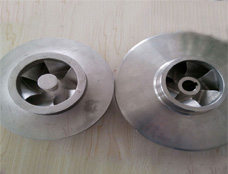+86 311 85258258
+86 311 85258258
Jun. 21, 2021
Should You Consider Stainless Steel Impellers?
Stainless steel has always been the ideal choice for impellers due to its surface properties, overall strength, and long service life. But bronze has been the industry standard for many years-resource-based on the economy, ease of manufacturing, and its lighter weight help improve hydraulic performance. Bronze is durable. Stainless steel is usually used for special facilities and customized projects because of the high cost. With the advancement of manufacturing technology, stainless steel has become a more viable choice. In many cases, stainless steel impellers represent better value because they are less likely to incur expensive repairs due to corrosion and abrasives.
Make difficult choices
Although metal hardness is not the only criterion for wear resistance, metal hardness does provide a convenient indicator to choose the most suitable manufacturing application for you. The following is a list of commonly used materials for manufacturing impellers, the order listed is to increase wear resistance:
Cast iron
Bronze
Manganese copper
Nickel Aluminum Bronze
Cast steel
Stainless steel
Break the tradition and resist corrosion
You cannot get the same corrosion resistance from bronze as stainless steel. The surface characteristics of bronze make it wear faster over time. While alloys are often used to strengthen bronze impellers for easy dezincification-this dissolves zinc and degrades metals. Grade 303 and 304 stainless steel impellers are designated for all but the most highly corrosive applications.

Stainless Steel Impeller
Although there may be some extreme applications where very high chemical concentration where stainless steel is not suitable, stainless steel can be used for many applications of acids and bases. In fact, grade 316 stainless steel impellers are specifically used for food and pharmaceutical applications. Although there are some special grades of bronze with similar corrosion resistance, they are more difficult to manufacture and more expensive.
Consider long-term value
When you choose an impeller, consider the long-term value of stainless steel over other metals. Consider the following:
Application
Strength
Corrosion resistance
Wear-resistant materials
Cavitation resistance (abrasion of hard and soft metals)
Overall cost
Stainless steel provides greater durability, improved surface characteristics, thereby improving sustainable hydraulic performance and energy efficiency, improving chemical resistance and application flexibility, reducing corrosion or degradation potential, enhancing consistency between impellers, and easy cleaning and lowering maintenance costs. This adds up to longer service life and a better overall value.
We are Stainless Steel Impeller Suppliers. Please feel free to contact us if you are interested in our products.